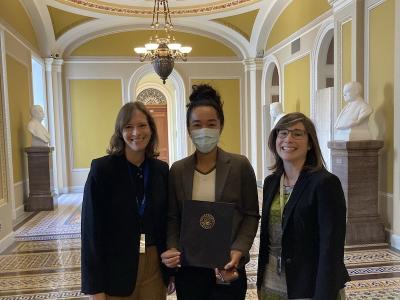When Carina Fish was studying earth and planetary sciences at Harvard College, one of her academic advisors asked for her thoughts on why there weren’t more Black students in the field.
Fish herself was unsure, so she decided to poll her roommates. They explained that they saw other potential careers — in law or medicine, say — as a more direct route toward advancing the welfare of Black Americans. Working in oceanography or other physical scientific fields seemed to offer far less tangible social impacts by comparison.
This thought kept nagging Fish's mind; a decade later, it helped push her to join the John A. Knauss Marine Policy Fellowship Program.
The Knauss fellowship is a one-year program, sponsored by the National Oceanic and Atmospheric Administration (NOAA) and the National Sea Grant College Program. Fellows work for a year in federal government offices in Washington, D.C. Fish served as a legislative fellow, covering Sen. Cory Booker’s environment and energy portfolio, with an emphasis on environmental justice. The fellowship, she says, provided a chance to see “how the cookie gets made”: how her science can help bring more justice to the world by supporting the development of new policies and legislation.
Fish first fell in love with marine science as a junior in high school, when she spent a semester living and learning at Eleuthera, and island in the Bahamas. After Harvard, Fish completed a doctorate at the University of California, Davis, where she examined interdisciplinary aspects of the deep sea and ocean change — everything from geochemical studies of California corals to an examination of the relations between small island nations and deep sea mining entrepreneurs. Early on, Fish collaborated with a public-private partnership focused on marine ecosystems in north-central California, which helped her realize it’s important to keep the end user in mind when conducting science.
“I want to see my research utilized — not sitting on a shelf for ten years,” Fish says.

Working for Sen. Booker during her fellowship, Fish saw how science can be used to bolster legislation. She is especially proud of her work on the Protecting Communities from Plastics Act, which sought to broaden the discussion from plastic pollution in oceans to how communities near plastic production facilities, many of them majority Black, often suffer from toxic byproducts and waste streams. Fish led the outreach to external stakeholders and advocacy groups — building relationships with groups with deep knowledge on the issues.
That experience underlined how experts — from organizations like the Center for Biological Diversity, We Act, and Upstream Solutions — can be essential to shaping effective legislation. Since legislators must consider a plethora of widely different subjects in each legislative session and staffing is limited, such groups can play a key role in legislation, Fish realized: a scientific expert who is well-versed in politics can have a massive impact.
Ultimately, Fish wants to return to academia, ideally to an R1 university, where she will be able to conduct research but also take on policy roles. But for now, she plans to remain on Capitol Hill to learn more about how she can use her science to help make a better world.
About California Sea Grant
NOAA’s California Sea Grant College Program funds marine research, education and outreach throughout California. Headquartered at Scripps Institution of Oceanography at the University of California San Diego, California Sea Grant is one of 34 Sea Grant programs in the National Oceanic and Atmospheric Administration (NOAA), U.S. Department of Commerce.